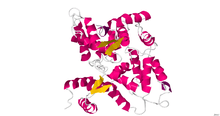Neurocalcin
| neurocalcin delta | |
|---|---|
 | |
| Identifiers | |
| Symbol | NCALD |
| Entrez | 83988 |
| HUGO | 7655 |
| OMIM | 606722 |
| RefSeq | NM_001040628 |
| UniProt | P61601 |
| Other data | |
| Locus | Chr. 8 q22-q23 |
Neurocalcin is a neuronal calcium-binding protein that belongs to the neuronal calcium sensor (NCS) family of proteins.[1][2] It expressed in mammalian brains. It possesses a Ca2+/myristoyl switch
The subclass of neurocalcins are brain-specific proteins that fit into the EF-hand superfamily of calcium binding proteins. The NCS family were defined by the photoreceptor cell-specific protein, recoverin. Neurocalcin was purified from the bovine brain by using calcium-dependent drug affinity chromatography. The amino acid sequence showed that neurocalcin has three functional calcium binding sites. It is expressed in the central nervous system, retina, and adrenal gland. With this unique pattern of expression it is thought that neurcalcin offers a different physiological role than similar proteins visinin and recoverin.
External links
- Neurocalcin at the US National Library of Medicine Medical Subject Headings (MeSH)
- NCS proteins
- Protein Database Page
References
- ↑ Burgoyne RD (2007). "Neuronal calcium sensor proteins: generating diversity in neuronal Ca2+ signalling". Nat. Rev. Neurosci. 8 (3): 182–193. doi:10.1038/nrn2093. PMC 1887812
 . PMID 17311005.
. PMID 17311005. - ↑ Burgoyne RD, O'Callaghan DW, Hasdemir B, Haynes LP, Tepikin AV (2004). "Neuronal Ca2+-sensor proteins: multitalented regulators of neuronal function". Trends Neurosci. 27 (4): 203–9. doi:10.1016/j.tins.2004.01.010. PMID 15046879.
- Terasawa, M; Nakano, A; Kobayashi, R; Hidaka, H (1992). "Neurocalcin: a novel calcium-binding protein from bovine brain" (PDF). The Journal of Biological Chemistry. 267 (27): 19596–9. PMID 1527077.
- Hidaka, H; Okazaki, K (1993). "Neurocalcin family: a novel calcium-binding protein abundant in bovine central nervous system". Neuroscience research. 16 (2): 73–7. doi:10.1016/0168-0102(93)90074-Z. PMID 8387172.
- Ladant, D (1995). "Calcium and membrane binding properties of bovine neurocalcin delta expressed in Escherichia coli". The Journal of Biological Chemistry. 270 (7): 3179–85. PMID 7852401.